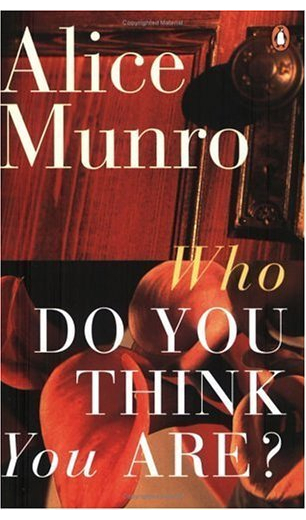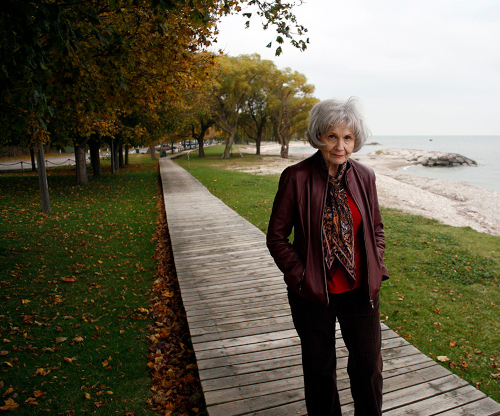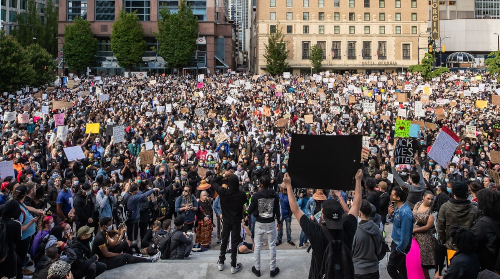
Reflections on Vancouver, British Columbia and other topics, related or not
Any resemblance to actual
persons is coincidental?
Probably no one will ever portray Canadians
as well as Alice Munro. In doing so, her work
reflected struggle against a Canadian malady
Greg Klein | June 22, 2024
Wingham, Ontario, seen here in 2017, provided the model for Hanratty.
Now, throughout Canada, petty resentment manifests itself more than ever.
(Photo: Barun Bakshi)
Who Do You Think You Are?
That’s the question Rose asks herself throughout this novel of short stories. It’s also a question at least implied by other people around her, people with whom she doesn’t fit in—which is almost everyone. It’s largely through Rose’s reflections about others that she achieves varying levels of self-awareness. It’s also largely through Alice Munro’s portrayals of others that she develops Rose as a highly credible, often recognizable and usually interesting person. Canadian literature likely has no one nearly as talented at characterization, arguably fiction’s most important element. So addressing the “who do you think you are” aspect would be parenthetical to discussions of Munro’s work.
Even so, it’s a distinction of Canadian society strongly captured here but underplayed in the publicity following Munro’s death last month.

From the outset, Rose has to find her own way. She’s distinguished by outlook from her upbringing in West Hanratty, the poor side of small town Hanratty proper and a surprisingly backward hick culture just 120 miles or so west of Victorian Toronto in the late 1930s and into the post-WWII years. She gets little guidance and has no mentors among family, friends, teachers or acquaintances.
Outside of books, Rose’s faint hope for wisdom is her stepmother Flo, a Munro masterpiece of country behaviour and dialect but with verisimilitude that avoids cliche. Sometimes a contrast, other times a foil to Rose’s gradual maturity, she occasionally provides maternal goodwill. It’s with uncharacteristic shyness that Flo praises a prize-winning high school essay by Rose. Rose was surprised that Flo even asked to read it.
More characteristically, she offers Rose plenty of worldly advice for her prize trip to Toronto, a place Flo claims to understand thoroughly after working in a Union Station coffee shop. The police, she warns, would “be the first ones to diddle you!” Well the cops didn’t, but in a story about Rose’s very awkward sexual yearning, she learns Flo’s cynicism about men isn’t so far off.
Rose leads a compartmentalized life in which school is so much different from home; divisions strengthen when she encounters city life, the middle class, artsy types and the rich. For the sake of social survival she acts different roles among different people, feeling the strain when two of her worlds clash. That’s the case when she comes home with her rich future husband for supper with Flo and a friend.
Rose’s chameleon personae leave her feeling guilty of betrayal. Acquaintance with Simon, the person most likely to offer love and mentoring, ends all too quickly, although with powerful perspective on her own circumstances. Even the bond with her daughter weakens after divorce. As West Coast braggarts, her rich ex and his new wife send Rose a taunting photo of her daughter ensconced in luxury.
Rose encounters Hanratty-quality social bigotry even at a Kingston gathering of minor academics. She feels intensely out of place despite being a university instructor herself. A student subjects her to offensive abuse, then a group of other instructors express themselves through mumbled derision and nasty looks, implying the recurring question: Who do you think you are?
With that as a title, the last story of the collection takes us back to Hanratty where the question becomes a high school teacher’s rhetorical scold. She punishes teenaged Rose for not copying out a poem to memorize. The guardian of propriety brushes off Rose’s explanation that she quickly memorized the poem on reading it, an ability that hick pedagogy had to reject.
Just who did she think she was, anyway?
Yet Hanratty did tolerate, if grudgingly, an ostentatious nonconformist at the other end of the local cognitive spectrum. Flamboyantly unihibited and fantastically named, Milton Homer unwittingly poses irony missed by the townsfolk. His lampoonish mimicry mocks the town’s notables in their many pre-TV-era parades—the only occasions that allowed proper Hanrattians to step out of their “preferred obscurity” (as long as their dour demeanor hid the fact that they actually enjoyed “parading”). Milton’s antics eventually drag down the locally once-powerful Methodist influence and his own once-powerful Methodist family, now reduced to himself and two spinster aunts—one, the teacher who had dragged Rose down with that supposedly damning question.
While some of the stories bring Rose increased self-understanding, others end with conflicting thoughts and confused emotions, probably most frustrating for male readers. But this last story presents an epiphany.
A mature Rose revisits Hanratty to move Flo into the county home and close up her house, the town’s only remaining “eyesore.” The burg has undergone an homogenizing modernization, oldsters have died off or been packed off and newcomers have moved in. Some old-time acquaintances invite Rose to an evening at the Legion. (Much more common social centres than now, even in cities, Legion halls, at least those in B.C., were notorious for backward behaviour.) Self-conscious and even feeling guilty about her other-world stature (she’s now a middling-talent actor with middling Canadian TV success), she briefly takes a look at the photos attached to the walls. Then she remembers that showing an interest—in anything—could be considered who-do-you-think-you-are showiness, an attitude that’s survived Hanratty’s transformation.
But the evening brings a chance encounter with Ralph Gillespie, an old high school chum who might almost have become a boyfriend. Here, Munro conveys warmth generally absent in the rest of this book. Rose realizes her brief acquaintance with Ralph—himself a mimic of Hanrattians, even specializing in Milton Homer send-ups—constituted her strongest Hanratty camaraderie. Watching his impromptu performances for schoolmates had made teenage Rose realize a longing “to fill up in that magical, releasing way, transform herself; she wanted the courage and power.” For all that, Ralph’s not a person imaginable anywhere in Rose’s post-Hanratty life. Yet meeting him again, after all these years, all those experiences, clarifies so much for Rose.
More than ever, she’s approaching an answer to the big question. But to other people, whether the Hanratty of Rose’s childhood and adolescence, Kingston academia, modernized Hanratty or other locations and social milieus, it’s not a question but a resentful prohibition.
As a child, Rose recited an indelicate rhyme about “two Vancouvers
fried in snot.” She was mistaken about the quantity.
No doubt common to many societies, it seems especially prevalent in Canada. Although ostentatious appearance and behaviour have become trite, resentment now seethes like never before, oozing forth probably more in Canadian cities than small towns. Hanratty might have been typified by the who-do-you-think-you-are scold. Vancouver is typified by the revenge of the inadequate.
And in a final note of Canadian despair, Munro’s artistry was anomalous. There’s no reason to think this country will ever produce another writer of such talent.
Postscript: Unsettling news about Alice Munro has brought confused controversy about her writing. That might result from a society that admires pop stars for their public image more than anything else. This commentary discusses the difference between authors’ lives and their work.


